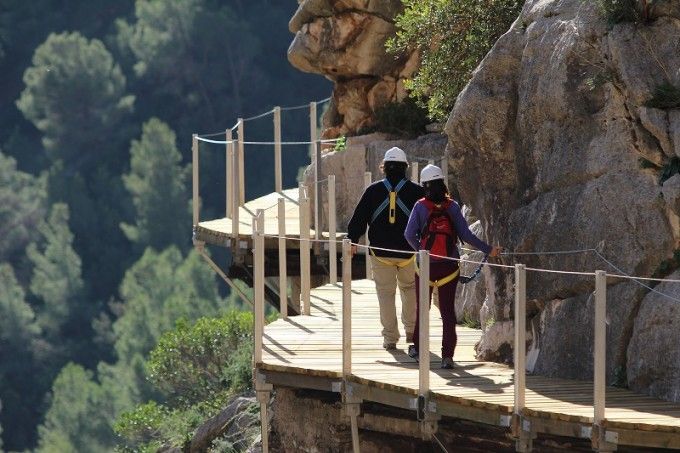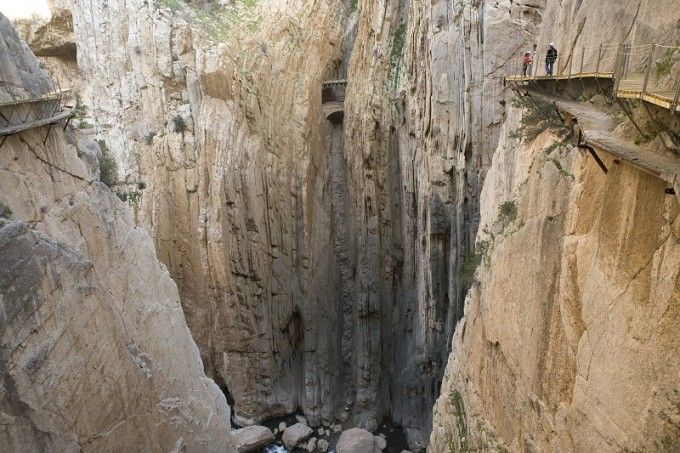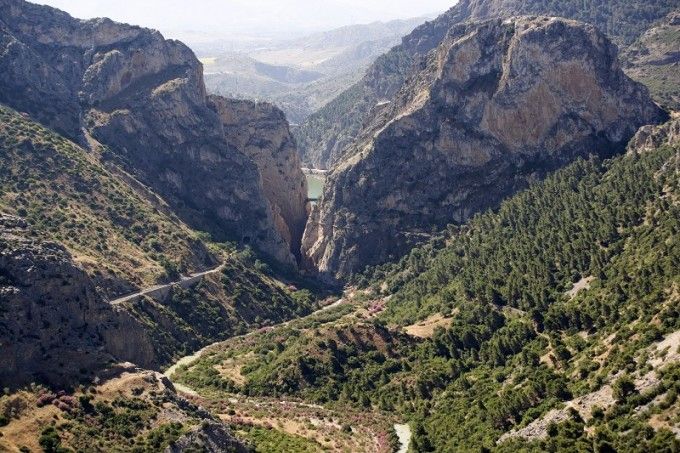Algunos dicen que Málaga tiene dos catedrales, una eclesiástica y otra
del vino!
Así como Rioja, Ribera del Duero, Cognac, Champagne, y todos los vinos y
licores con denominación de origen, también la Costa del Sol hace
diferenciación por clima y zona geográfica para producir una uva
extraordinaria con carácter excepcional que se convierte en el Vino
MÁLAGA D.O.
Málaga es un vino elaborado con uvas Moscatel y Pedro Ximénez principalmente de la Axarquía.
El vino de Málaga y sus bodegas
Algunos dicen que Málaga tiene dos catedrales, una eclesiástica y otra
del vino!
Así como Rioja, Ribera del Duero, Cognac, Champagne, y todos los vinos y
licores con denominación de origen, también la Costa del Sol hace
diferenciación por clima y zona geográfica para producir una uva
extraordinaria con carácter excepcional que se convierte en el Vino
MÁLAGA D.O.
Málaga es un vino elaborado con uvas Moscatel y Pedro Ximénez principalmente de la Axarquía.
La historia de la producción de vino en Málaga y sus alrededores se
remonta a la llegada de los fenicios en el siglo VIII A.C., por ello es
una de las más antiguas de Europa.
La principal característica de este vino es principalmente su dulzor.
Además de ser una buena opción para los postres, los malagueños lo toman
a cualquier hora en bares tradicionales donde podemos respirar el
auténtico espíritu Al Andalus y probar los típicos vinos locales.
Los vinos Málaga tienen carácter especial y merecen degustarse
tranquilamente. Para ello presentamos los bares más auténticos e
históricos de la ciudad malagueña cuya personalidad aporta un valor
extraordinario a la ciudad, por ofrecer una experiencia
lúdico-gastronómica originalmente fantástica para una experiencia única.
Antigua Casa de Guardia
Taberna-Museo también conocida como “El Barril Místico” ya que aquí
se dice que el Barril contiene lo más especial, raro y querido de una
bodega solo al alcance de un grupo reducido de privilegiados. Esta
bodega, a la par que taberna y bar, es la más antigua de Málaga, fundada
en 1840 por Don José Guardia y se trata de un refugio indispensable
para quienes adoran la calidad en el beber.
Una auténtica herencia cultural de la Axarquía, en la producción
tradicional de elaborar el vino de Málaga, de la misma manera que se
viene haciendo hace más de 100 años.
Cabe destacar que la Antigua Casa de Guardia fue galardonada con el
premio de Empresa Emblemática en Málaga, y a quien la reina Isabel II
nombró como proveedor autorizando a usar el sello real en su
embotellado.
Es, sin duda, un verdadero lugar para la cultura.
Con su larga y antigua barra de madera de roble y sus barriles de viejos
robles rusos con grifos cubanos que mantienen la misma esencia desde
hace más de 170 años. La peculiar manera de anotar las cuentas sobre la
barra con tiza, nos remontan al pasado glorioso de la casa, además de
sus cuadros, vitrinas y botellas antiguas.
La nota de humor la ponen los malagueños, al decir: "
sabemos cómo entramos, pero no sabemos cómo vamos a salir..."
Bodega-Bar El Pimpi
Referencia en Málaga por excelencia. El más famoso de la Costa del
Sol y más emblemático bar de tapas de la ciudad, algunos lo consideran
una institución. Una parada esencial para todo visitante de Málaga.
Su nombre, “El Pimpi”, recuerda a un personaje típico muy popular en
la ciudad que ya se ha perdido: Los Pimpis, que eran jóvenes serviciales
que ayudaban a la tripulación de los barcos y a los pasajeros, que con
el tiempo se convirtieron en los primeros guías de turísticos.
El Pimpi ocupa un antiguo caserón malagueño del siglo XVIII ubicado en
el corazón de Málaga, y a escasos metros de la popular Plaza de la
Merced.
Una Bodega-Bar con un típico y encantador estilo malagueño que ofrece la
oportunidad de disfrutar de la tradicional comida local y el vino
Málaga Virgen de la premiada Bodega como la mejor de Andalucía.
Espacios decorados con interesantes colecciones de antiguos carteles de
feria y de festejos taurinos, rodeados de barriles dedicados y firmados
por famosos amigos como la familia Picasso, Antonio Banderas, los Duques
de Alba, Rafael Nadal, artistas del flamenco, políticos y
personalidades de todo tipo.
Para el viajero y turista, la visita a la bodega es una parada obligatoria en esta bella y emblemática ciudad.
Estos lugares son de peregrinación para turistas, y es que el vino, uno
de los mayores placeres de la vida, ocupa un lugar importante en la
capital de la Costa del Sol.
¡Visiten Málaga para una experiencia extraordinaria en todos los sentidos!
Fuente: http://www.vacaciones-espana.es/Malaga-ciudad/articulos/el-vino-de-malaga-y-sus-bodegas-gran-reclamo-turistico
Wine in Spain
Spain is the most widely planted wine producing
nation in the world. In 2011, it had over 2.9 million acres of
productive vineyards. Lower relative yields put Spain, just behind
France and Italy, in global aggregate production. However, Spain still
produced an impressive 3.4 million tonnes of wine in 2011.
Some
Spanish wines and wine growing regions are almost household names;
Rioja, Ribera del Duero, Priorat, Albariño Jerez and Jumilla and to a
lesser extent the wine growing regions in Valencia, Ribeiro, Bierzo,
Valdeorras, Cigales, Costers del Segre and Toro. With many, many more
in-between.
It is often said that Spain can offer a bottle for every wine drinker.
The
DO - Denominación de Origen - designation of Origin – is used to
denominate quality and geographical origin among Spain’s finest
producers.
Malaga’s wines
Malaga has one of the longest wine producing histories in the world, dating all the way back to Phoenician times.
Malaga's traditional wines and wine bars
Wine in Spain
Spain
is the most widely planted wine producing nation in the world. In 2011,
it had over 2.9 million acres of productive vineyards. Lower relative
yields put Spain, just behind France and Italy, in global aggregate
production. However, Spain still produced an impressive 3.4 million
tonnes of wine in 2011.
Some Spanish wines and wine growing
regions are almost household names; Rioja, Ribera del Duero,
Priorat, Albariño Jerez and Jumilla and to a lesser extent the wine
growing regions in Valencia, Ribeiro, Bierzo, Valdeorras, Cigales,
Costers del Segre and Toro. With many, many more in-between.
It is often said that Spain can offer a bottle for every wine drinker.
The
DO - Denominación de Origen - designation of Origin – is used to
denominate quality and geographical origin among Spain’s finest
producers.
Malaga’s wines
Malaga has one of the longest wine producing histories in the world, dating all the way back to Phoenician times.
The
Greeks, the Romans and the Moors were all fond of Malaga’s wines,
encouraging its production and export. Changing tastes and the
vine-destroying plagues of the 19th century, all but decimated Malaga’s
wine industry.
Today, Malaga is the largest of the DO wine zones
in Andalucia, with approximately 3000 acres planted in some 30 vineyards
(Bodegas) and produces over 2 million litres annually.
It is
best known for its sweet wines made from the Moscatel and Pedro Ximenez
grape varieties. The two varieties of grape tend to be concentrated in
the Axarquia growing region of Malaga province, not far from the town of
Velez Malaga.
There are three main grape growing areas in Malaga
Province; east of Malaga in the Axarquia region, west of the city and
centred around the village of Manilva where the larger Moscatel grapes
are grown - mainly for eating. The most intensive farming is just north
of Antequera, where a sweet variation of the Pedro Ximenez variety
predominates.
Despite the fact that the grapes are being grown,
pressed and sometimes fermented in other parts of the province, Malaga
wines are all aged in Malaga city itself.
Having a small glass of
sweet wine is part of the culture. Part of the social fabric that makes
up Andalucia. There is no better place to try Malaga’s traditional
wines than in one of the original wine bars.
Bar Pimpi and the Antigua Casa de Guardia are, without a doubt, two of the very best.
Antigua Casa de Guardia
The
Antigua Casa de Guardia is the oldest wine bar/tavern in Malaga.
Founded in 1840 by Don José Guardia, the Casa de Guardia is so much more
than a wine bar or cellar. Its an institution. For wine lovers, it is a
place that must be visited when in Malaga.
A true cultural heritage that has been producing wine in the same way for the last 172 years.
The
Casa de Guardia is sometimes locally nicknamed as “El Barril Místico” -
“the Mystic Barrel,” a place that contains a wine that is so rare, so
scarce and so valuable that only a select few are able to try it.
Queen
Isabel II appointed the Antigua Casa de Guardia as their official
Malaga wine supplier, even allowing the Royal seal to be used on their
bottling. Which was no small feat. The bar has little changed over the
years.
With its age-old oak counters and cask wooden barrels, the
wine is pulled using Cuban/Russian taps that date from before the
Second World War.
The bill is still chalked on the bar in front
of you, the antiques, the paintings and the carefully preserved bottles,
all combine to make the Casa de Guardia an authentic living museum.
Bodega-Bar El Pimpi
The
most famous tapa bar on the Costa del Sol and one of Malaga’s most
iconic landmarks, no visit to Malaga is complete without visiting El
Pimpi.
It consistently ranks as top of any places to see in Malaga list. The
appeal is easy to understand. The bodega - bar is situated in a former
eighteenth-century mansion located right in the heart of the city, just a
stone’s throw from the popular Plaza de la Merced.
The typical
bar oozes Andalucia charm, with interior patios and terraces that are
perfect to wile away warm summer evenings, while sipping wine and
enjoying some local tapas. The food is second to none and is also
responsibly priced. Its Malaga Virgin wine was voted as being the best
in Andalucía.
Bodega-Bar El Pimpi is decorated with old pictures,
posters, bull fighting memorabilia and old barrels, many of which, have
been signed by its numerous famous visitors such as the Picasso family,
Antonio Banderas, the Duke of Alba, Rafael Nadal, various big names in
Flamenco, politicians and numerous other celebrities.
Bar Pimpi is the place to be in Malaga.
A
visit to a bodega in this beautiful and emblematic city is a must for
any traveller or tourist. They form the route of a pilgrimage for
tourists who enjoy the great pleasures of wine, occupying an important
place in Costa del Sol tourism. Visit Malaga for this unparalleled
experience that touches all the senses.
From: http://www.spain-holiday.com/Malaga-city/articles/malagas-traditional-wines-and-wine-bars




















